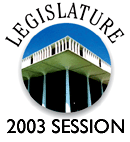
Bill would have
public school students
pay $20 for booksAnother measure requires children
to be 5 to start kindergarten
A bill allowing public schools to charge students $20 a year to help pay for textbooks was poised for a final vote at the Legislature today, along with one requiring children to turn 5 before starting kindergarten.
Both proposals would not take effect until the 2005-2006 school year.
Legislature Directory
Legislature Bills & Hawaii Revised Statutes
The bill raising the kindergarten age allows for individual exceptions and asks the school system to provide "pre-kindergarten" services to younger children who would be shut out of school by the change in enrollment date.
The proposed textbook fee would be waived for students who qualify for subsidized school lunches. Currently, public school students are asked to provide an array of supplies at the start of the school year, from pens to paper towels, but the only fees charged are for co-curricular activities and items such as yearbooks.
The fee, first proposed by Sen. Norman Sakamoto (D, Salt Lake-Foster Village), is intended to help address the chronic shortage of textbooks in the public schools. The proposal, now contained in House Bill 32, CD1, prompted little opposition from the public as it moved through the Legislature, although some Republican legislators denounced it as a tax.
"In light of the general public saying, 'We're willing to pay more taxes if it goes to education,'" Sakamoto said yesterday, "my hope is the bill will take a little pressure off the textbook shortage and improve education in that way."
The legislation leaves the decision on whether to impose the fee up to the schools, and funds collected would be kept at the school level.
The bill raising the age for kindergarten entrance (Senate Bill 17, CD1) requires children to turn 5 on or before Aug. 1 of the year they start school. Children now must turn 5 on or before Dec. 31 of the year they start school.
For students born in the latter part the year, who would be shut out of kindergarten, the legislation directs the Department of Education to provide "appropriate educational programs" such as pre-kindergarten. The department is to report back to the 2004 Legislature on how it plans to implement that provision, whether it should be permanent and what it would cost.
The push to raise the kindergarten age is intended to bring Hawaii's public schools in line with the state's private schools and most mainland states, which generally require children to turn 5 by the start of the school year.
Advocates say that a few months can make a big difference in maturity, and 4-year-olds who struggle in today's academically oriented kindergartens may fall behind for years or be mislabeled as requiring special education. Statistics show that a disproportionate number of children born in the second half of the year are classified as learning-disabled.
The bill sparked some opposition from those who argued that keeping children out of school longer will not help them learn unless they are in preschool. The provision for pre-kindergarten came in response to that concern.
Others opposed the bill on the grounds that parents should be allowed to decide when to put their kids in school. The final version asks the department to develop criteria to determine readiness for kindergarten and to allow for exceptions for children shown to be ready.
